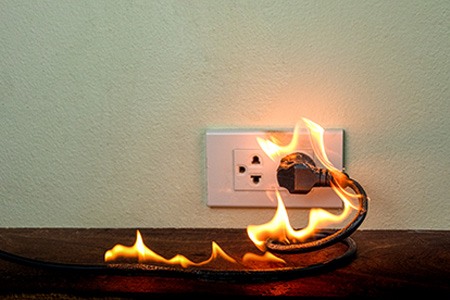Get Rid of the Fish Smell in Your House Quickly
Author: Anne Cowart | Editor: Omar Alonso
Review & Research: Jen Worst & Chris Miller

Did that fried cod taste delicious? Of course, it did. But now there's a fish smell in your house that reeks beyond belief. It almost makes the meal seem irrelevant as you wish you never took Gordon Ramsey's advice on preparing the dish.
If your home smells fishy, it's not the end of the world. You can always deodorize and restore the air quality. But what if you weren't cooking a seafood dinner and there's a fish smell in your house? That could be a sign of a severe problem with your electrical system.
Fortunately, we put together this guide to give you everything you need to know about removing a fish smell. If you cooked a seafood meal recently or the house smells like fish, and you didn't have anything in the frying pan or oven that evening, we have the solution in this post.
How to Get the Fish Smell Out of Your House

If you want to know why fish smell like they do, then check out that link. Otherwise, let's start with removing fish smells after cooking a seafood meal. Follow this strategy to get your home smelling fresh again.
Improve Ventilation
Provided the weather isn't chilly, open the doors and windows throughout your home to increase the airflow through rooms. The improvement in circulation and ventilation replaces the fishy air with fresh air from outside, removing the bulk of the smell.
Obviously, the best approach would be to turn on the exhaust in your range hoods as you're cooking to reduce the amount of odors that venture out into the rest of the house. Those escaping odors will be taken care of by the drafts created by opening your windows.
Use Vinegar to Deodorize the Air
Next, fill a few small dessert bowls halfway with white spirit vinegar. Lay them out in the rooms and leave them to evaporate into the air. The vinegar traps the fish odors, sterilizing them. You'll have a fresh-smelling home in a few hours, and the vinegar smell dissipates shortly after that.
Take Out the Garbage
Don't throw fish leftovers in the trash! Take them outside and toss them in the outdoor garbage bin. Preferably, put them in a plastic bag to minimize the odor the scraps generate and stop cats and rats from finding an easy meal.
Wash the Dishes After Cooking
After you finish your fish meal, wash the dishes immediately, and don't leave them in the sink. At the very least, place them in the dishwasher and close the door to trap the odors in the appliance. Wipe down the cooking area to remove any fish oils left on the surface.
Make Homemade Potpourri

If the kitchen stinks after cooking fish, grab a fresh pot, place it on the burner, and fill it halfway with tap water. Cut up two lemons, squeeze the juice into the water, and drop in the squeezed lemons. Add two cinnamon sticks and boil the water openly before reducing it to a simmer.
The vapors spread throughout the kitchen and your home, neutralizing the fish smell. You can use other fragrance herbs and spices in your boiling potpourri mix. We recommend citrus fruits like grapefruit, limes, and oranges, but you can add rosemary, vanilla extract, and apples to this candle alternative mix.
Inspect Carpet Fabrics
If you ate dinner in the living room, you might have accidentally spilled some sauce or something on the carpet while transporting the meal. Oils or sauces might have spilled on the carpet and rug, where they started to stink. Examine the floor and look for signs of spills on the pathway you used from the kitchen to the dining room or lounge.
Cover a spill with baking soda and work it into the carpet or rug fibers if you find it. Add a teaspoon of vinegar to the baking soda and rework it into the carpet. Baking soda absorbs the smell, and the vinegar neutralizes the offensive odor of the fish.
Light a Scented Candle
After cleaning up, light a scented type of candle as an alternative to the boiled potpourri. If you don't have a candle, you can always add a few drops of essential oil to a diffuser to create the same effect.
Other Reasons for a Fish Smell in Your House

Why does my house smell like fish? If you didn't cook any fish tonight, and the house smells like seafood, you might have another problem on your hands. The fish smell in the air might signal something much worse – burning electrical wires.
The wiring in your home is usually in the walls, ceiling, and under the floor, out of sight. If the electrical system experiences an overload or two bare wires touch each other, it presents a problem. Electrical wires in your home have an insulated plastic coating to prevent electrical accidents and fires.
However, the insulation starts to burn when the system or appliances experience electrical overload. The heated insulation gives off a fishy smell as it combusts, creating the seafood odor you're smelling in your home.
If you recently used an appliance like the microwave, that's the first place to look. Other energy-intensive appliances like the fridge, ovens, chest freezers, and anything requiring a dedicated circuit tend to create an overloaded circuit, burning the wiring.
What Do You Do If You Suspect Burnt Wiring?
If you notice a fishy smell and haven't cooked any seafood, immediately shut off the power to your home. Find the breaker board and flip the main switch or earth leakage to the home electrical circuit. If it is the wiring that's burning, leaving the electricity on will eventually result in an electrical fire that's challenging to put out.
Check the appliances in your home for hot cables. Then call an emergency electrician. Don't turn the power back on to the house until the electrician inspects the premises. If you can't get someone out to the house or apartment before the morning, don't turn the power back on until they arrive and finish their inspection. Doing so could start an electrical fire.
Outlets are another common source of the problem. Check all the outlets in the house (using a torch) to see if they show any signs of burning. Get close to the vents in the wall to see if you notice if the smell gets stronger – that's a sign that the wiring in the wall could be burning. Feel the walls to see if they're warm to the touch, and do the same with the ceiling.
Unless your home has old wiring or wiring installed with substandard connections, you probably caused the issue by overloading the circuits. The most likely cause of the problem is perhaps a bad connection at a switch, socket junction, or junction box.
Damaged wiring chewed by rodents or moved around by other pests might also be a potential cause of the problem.
Why Does Wiring Overheat?
Wires don't usually start overheating for no good reason. If the cable to your fridge or microwave feels hot to the touch, it's a sign the device is drawing too much current and not operating efficiently on the home's electrical circuit.
When electricity travels through wiring, it creates resistance, which, in turn – generates heat. In safe electrical applications, electricity should never move through mediums, creating more resistance than required.
So, the electricity moving through the wiring shouldn't be greater than the capacity of the wiring to carry the current safely without generating excessive heat. With electrical wiring, there's no additional protection to stop overload because it's not designed to carry current over its specifications.
In cases of the wiring carrying too much current, it generates heat until the insulation melts and burns. At that point, you'll notice the fishy smell in your home, and you're moments away from an electrical fire breaking out.
FAQs Regarding a Fish Smell in Your House

Know that we know how to get the f ish smell out of your house, let’s look at some other common questions that come up during these discussions.
My House Smells Like Fish Days After Cooking… How Long Does it Last?
A fish smell in the home can last up to 12 hours after cooking a seafood meal. Some fish species and preparations smell stronger than others, but 12 hours is the general guideline for dissipating the odor.
How Do You Eliminate a Fishy Smell in the Oven?
If the fish odor in the oven is overbearing, allow it to cool and use a mix of water and spirit vinegar to clean the interior. Take an oven-safe bowl, fill it a quarter of the way with water, and add a teaspoon of vanilla extract. Set the oven on. Bake at low heat and leave the bowl of water and vanilla in the oven for around an hour to kill the fishy smell.
How Do You Eliminate a Fishy Smell in the Microwave?
To deodorize your microwave, add a cup of water and three tables spoons of white vinegar to a microwave-safe bowl. Leave the bowl in the microwave and heat it on low power for five minutes. Remove the bowl and replace it with another bowl containing a cup of baking soda. Leave it in the microwave overnight to absorb the odor.
Key Takeaways for That Fishy Smell in Your House

- You could have a fish smell in your home for two reasons.
- You recently cooked a fish meal, and the smell permeates the air.
- Or there's an issue with the electrical system, and the plastic insulation around the writing in your walls, ceilings, floors, or appliances is melting.
- Removing a fish smell is easy using our deodorizing tips.
- If you don't cook fish, melting wiring is a much bigger problem.
- If you suspect the wiring is at fault, turn off the power to your home at the breaker board and call an electrician immediately.
Eradicate the Fish Smell in Your House
If you have a fish smell in your house, you either recently cooked fish and need to ventilate your home, or you have some kind of electrical problem regarding wiring in an appliance or otherwise. If you think you have a wiring problem you should locate where the smell is coming from and turn off that breaker and call a professional.




